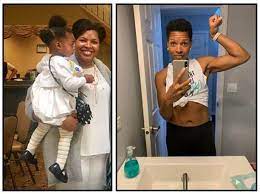
According to the American Heart Association (AHA), Black women face a greater risk of developing high blood pressure, having a stroke or developing complications during or immediately after pregnancy.
When Michelle Bradley Emebo was diagnosed with postpartum hypertension almost eight years ago, it was a wake-up call for her to take control of her health.
During her third trimester, Emebo’s routine checkup revealed consistently high blood pressure, leading to weekly follow-ups to monitor her condition. Although she gave birth to her daughter Sarai with no complications, her blood pressure remained high post-delivery. Despite expectations that her blood pressure and weight would normalize, Emebo struggled for months and eventually sought help from an internal medicine doctor who prescribed her a low-dose blood pressure medication.
Adjusting to a new medication became challenging for Emebo.
"It was challenging to juggle medication compliance and self-care while caring for my newborn. I had to prioritize my health to be a better parent,” she shares.
At the time, she was not paying much attention to her diet or exercise routine, and her blood pressure was a reflection of that neglect. However, she was determined to make changes that would allow her to manage her condition without relying solely on medication.

Emebo's journey began with a bold decision to cut off all her hair. This move was driven by her commitment to prioritize her health and fitness goals over maintaining a long hairstyle that would have hindered her training. It turned out to be the best decision she ever made.
"Cutting off my hair was a symbolic step towards prioritizing my health and fitness goals. It allowed me to focus on nutrition, diet, and exercise without the time-consuming upkeep of a long hairstyle. It was a bold decision that ultimately empowered me to make significant changes in my lifestyle,” she shares.
After consulting with her healthcare provider and a nutritionist, Emebo also began making significant changes to her diet.
"I had to cut out restaurant meals and reduce my sodium intake, which had a significant impact on my diet. It required discipline and a shift in my eating habits,” the clinical researcher shares."I also cut back on processed foods, particularly canned goods, which are often high in sodium. I became more mindful of the nutritional values of the foods I consumed."
Increasing her water intake was another significant change. Previously, she was not a big water drinker, but she realized the importance of staying hydrated, especially for managing blood pressure. She now starts her day with a glass of water and incorporates green juice into her morning routine for added hydration and nutrients.
Emebo also began reintroducing vitamins and supplements like vitamin C, which she had stopped taking during her pregnancy, back into her daily routine.
“Supplements played a role in supporting my health journey, especially since I was not always able to get all the nutrients I needed from my diet alone,” she notes.
Before her pregnancy, Michelle was active, but pregnancy and postpartum life led to a significant decrease in her exercise routine. To address this, she committed to intense exercise for at least 30 minutes, three times a week. She started with once a week and gradually increased to two or three times a week. She also utilized a family gym membership at Orange Theory to incorporate more workouts into her routine.
"Working with a personal trainer was instrumental in keeping me motivated and engaged in my workouts. We varied my routine with high-intensity training, weightlifting, and volume training to prevent boredom and maintain progress,” Emebo says.

As a mother and wife balancing motherhood, work, and personal health, Emebo has learned to prioritize self-care and find moments each day to take care of herself.
RELATED: Postpartum Cardiomyopathy Survivor: “I am the Author of my Story”
To manage anxiety and balance the demands of being a mother, working, and fulfilling family responsibilities, Emebo incorporates yoga and meditation into her routine.
Emebo, who was diagnosed with postpartum depression after her gynecologist noticed her subdued mood during a follow-up visit, also had therapy sessions twice a week, focusing on reframing her thinking and addressing the challenges of new motherhood, work-life balance, and marital adjustments. She found that focusing on the positive aspects of her pregnancy and seeking guidance from her therapist were key in overcoming this challenging period.
"These practices have helped me find moments of calm amidst the chaos of daily life. They have been instrumental in maintaining my mental well-being,” she adds.

After implementing these lifestyle changes, Emebo noticed immediate improvements in her health. She experienced reduced bloating and inflammation, particularly after incorporating more vegetables and whole foods into her diet. While the initial weight loss was gradual, she eventually saw significant changes after about three to four months. Her efforts were further validated during a follow-up visit with her healthcare provider, who commended her on her progress and appearance.
"My healthcare provider and I had ongoing discussions about my progress and the possibility of reducing or coming off the medication. It was a collaborative decision based on my health improvements and the effectiveness of my lifestyle changes,” Emebo says. "When my doctor mentioned the possibility of reducing my medication, it was a significant milestone for me. It was a validation of all the hard work I had put into managing my health,” says Emebo, who has since been able to manage her blood pressure without the assistance of medication.
Emebo, who has a family history of heart disease, is incredibly grateful for the progress she’s made. “Both of my parents have had strokes. My grandfather had open heart surgery. So heart disease was also something that I knew I had a high predisposition to. So it was just really important for me as much as possible to try to take control of my health with what I knew could potentially work,” she says.

"My advice to other women, especially those facing similar health challenges, is to take control of your health and not rely solely on healthcare providers for solutions. Be open to trying different approaches, accept failures, and make gradual, sustainable changes. Find healthcare providers and fitness routines that align with your personal preferences. The journey to health is about finding what works best for you,” she concludes.
Questions to ask your doctor if you are pregnant or plan to become pregnant
Cardiovascular disease is the leading cause of maternal death in the U.S., however, early intervention can help. Here are some questions to ask your doctor if you are pregnant or planning to become pregnant, according to the AHA:
- Am I at risk for cardiovascular health issues during my pregnancy? If so, how can I reduce my risk?
- How can my blood pressure levels impact my pregnancy and how can I best manage them?
- How can I keep myself and my baby healthy during my pregnancy and in the critical weeks after giving birth?
- I have a family history of heart disease or stroke. How can this impact my prenatal and postpartum health as well as the long-term health of my child?
- How can I support my emotional well-being and reduce my stress during my pregnancy?







